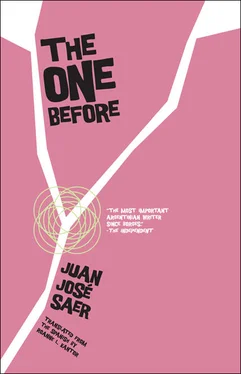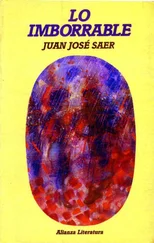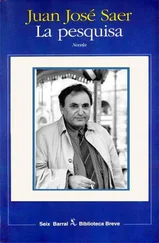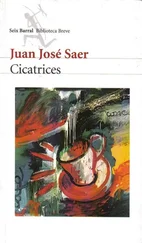No one can be killed , Leto thought, except one’s friends, but one cannot even kill them, because it is impossible to kill what is immortal.
The riverbanks sparkle, slowly, like signals: they ripple. The ocean is one and the same, always. Only its borders move, in place, and when one edge advances, it is the entire ocean advancing. We stand before the sea so that it can contemplate us. But we are always on one side of the river as it passes us without regard, disdainful. Its beaches are an immobile caravan of umbrellas — red ones, blue, orange with white stripes, green, spotted. The yellow sand splays out before the caramel-colored water in a weak semicircle. Burned bodies pass by, running along the border of the water, and on the shore they form the tri-colored fringe of a most unusual rainbow: the yellow border of the sand, the tawny water, and the transparent strip, between the two, of water kicked up by the constant drum of feet that convulse the shore. Gazing after the running feet, not considering their prior upheavals that have already been erased, always keeping your eyes locked on the feet hitting the water, you can perceive the transparent, whitish fringe, like an imaginary dotted line, between the sand and the river. If this description seems overwrought, just remember that more stable fringes, so to speak, like the white and red fringes of umbrellas are also, if you will, in essence, imaginary and interrupted borders.
Now we have returned from the beach and it is two-thirty in the afternoon. We are sprawled out on the bed, in a cool white room protected by dark curtains; there is another body, also naked, next to our own. To that empty cavern comes no more than the memory, and that only for a moment, of overlapping shores, of immobile paths, white and deserted. Now we see trees with leaves covered in a white powder that resembles volcanic ash. Now we see nothing. We feel that the other body is hot, thick, and burnt. We imagine that our own must be, too. We weave together in an intermittent struggle, interspersed with moments of complete immobility, in which we see our shaggy hair, our knees, our genitals, which fit together, which complement each other, our feet which lie placid, gnarled, isolated at the far end of the bed; we compare the burnt parts of our bodies with the white ones, in the places where we usually wear our bathing suits. Afterward we tangle ourselves into the final battle. We had touched the furthest point, the muddy bottom of the river, passed the riverbed and arrived in a translucent zone beyond the convulsed, blinding bottom, a point full of light like the very center of a diamond. That light was so intense that nothing could be seen, not even the light itself. In that struggle we came back up, dense and spinning, like the body of a drowned man, toward the confused darkness of the bottom where we engaged in combat. Further up the surface of the world remains, with the beaches, the pathways, the crowds, the city, the dark room where our bodies, now, are sprawled out immobile on the bed, looking at the ceiling. At noon we had stopped on the shore, trying to hear the multiple murmurs of the water, the polyrhythm and polyphony at the heart of it’s enduring monotony. We could make out nothing in that murmur except that it sounded a bit unsettling to us because we could make out nothing in it. At the same moment, on the other side of the border, a stingray, clotted with nerves and cartilage, stretching out to enjoy the heat of the shallower water close to shore, believes all of a sudden it feels, in the great confusion of its subcutaneous sensations, a monotonous murmur emanating from the beach, a murmur which it does not realize is composed of many voices: the song of the world.
Don’t be fooled: the news that came out in the paper last week, in the police blotter, which says very clearly that the owner of a bar, named Gandia, was arrested, gives a false impression of the person in question. It’s true that, as it appears, he played cards for money behind the bar, and that in the rooms out back a girl from the neighborhood, one of the poorest in the city, received her clientele, from which Gandia made a small commission. But don’t be fooled, don’t be put off: It’s not Gandia that news is about, it’s someone else, someone I’ve met.
That they would have put him in jail makes me smile. What’s more, it’s not the first time this has happened. In this slum, Gandia’s bar is the hub of perdition, the vicinity of vice. It is an obligatory stop for any backsliding prole. And its owner, Gandia, son of a laborer or a farmer — I don’t really know — has rough, callused hands, weighs over 200 pounds and is always dirty and poorly shaven. He is one of those men whose sullenness is too childish to be offensive, frightening, or even convincing. One can see from afar that Gandia is tangled up in himself, perpetually absorbed in internal discord, for reasons surely even he doesn’t know, and what appears to others is the harshness radiating from that derangement, like that man whom one sometimes encounters fruitlessly trying to screw in, for hours, the same microscopic little screw, and who greets one in a huff.
Gandia is a great card player. He’s a special card player, though: he cheats. Everyone in the world has discovered this trait, and yet no one has stopped playing cards with him. This is because Gandia, unlike other card players, whether they are cheaters or not, cheats and still manages to lose. He loses: an incontestable fact that all his patrons know. What’s more, they have seen players who, in the midst of a hand, have had the wisdom to consider Gandia’s tricks as a rational part of the game, which gives an idea of regularity and defined and cognoscible character to his cheating. Rarely has Gandia won a hand. With a new player when he’s at his best, the first time, because the second time the new player will have already adapted himself to the rules of the game as it is played at Gandia’s bar.
I don’t think that it makes any sense to form a moral judgment in Gandia’s case. There’s a more pertinent explanation and I think I can supply it: Gandia cheats out of courtesy. Destined to lose, Gandia diminishes the effect of his deep-seated inclination by cheating. It’s a courtesy to himself in the first place, since cheating gives his existence, otherwise purely linear, like a pebble falling from a vacuum into an abyss, the illusion of decline; for the other players, too, ridding them, through his tricks, of their scruples; and lastly, a sublime courtesy for the world outside, so mute and so fine, to supply it with, at his expense, a dramatic depth.
But the news that they had taken him into custody last week makes me smile. Don’t get worked up about it.
In this family, my brother would say whenever there was some kind of argument, the sane ones are traitors. He died last week in the mental hospital. He had spent the last twenty years of his life in there: I remember when I was little, we went to see him every Sunday with a package of sponge cake and oranges, and that sometimes he wouldn’t deign to receive us. Sometimes a male nurse would come to let us know that my brother was in no mood for visitors, and then we would head out along the dirt road toward the streetcar stop, more confused or humiliated than saddened, in the sunny hours of the Sunday siesta.
As I found out later from my mother, my brother’s illness had begun one very dry summer: the city, the surrounding countryside and the rivers were all baking slowly in the white January sun. You could barely step out onto the street or look in the direction of the sun. The city was practically empty; you could walk the streets for hours and not bump into anyone. The branches of the trees were gray and scorched, and the light beat down, bright, somewhat ashen, upon the patios.
Читать дальше












